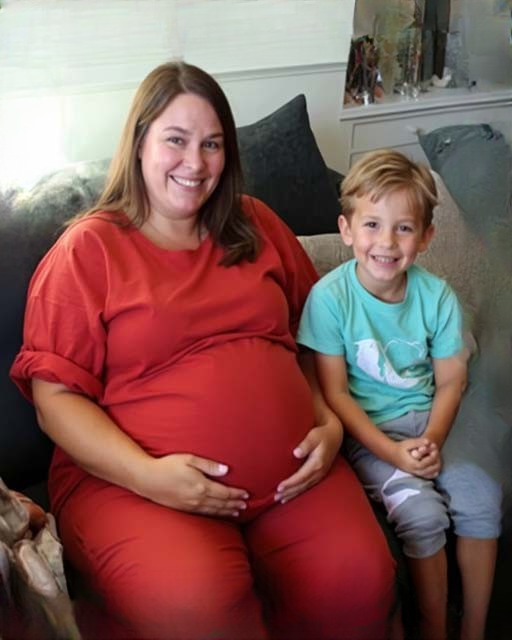The morning my husband left started like any other—except by nightfall, my life had been upended. The smell of burnt toast filled the kitchen as I juggled breakfast, a missing shoe, and the exhaustion of being eight months pregnant. My back ached, patience wore thin, and fatigue clung to me like a heavy fog. Then Michael appeared in the doorway, suitcase in hand, his expression unnervingly calm.
“I’m done, Eva,” he said. “I can’t do this anymore.”
I blinked at him. “Do what? Be a husband? A father?”
He didn’t answer. A silver sedan pulled up outside, and a woman stepped out—polished, slim, her hair glossy. Jenna. She was the reason my husband was leaving.
I didn’t cry. I didn’t scream. I just watched as he kissed our six-year-old, Lily, on the head, grabbed his suitcase, and left. The crunch of tires on gravel was the punctuation mark on the life I had known.
The days that followed blurred into survival. Not the dramatic kind, just quiet endurance. My body was heavy, my heart heavier. Three children depended on me: Lily, who asked questions I couldn’t answer; Sam, who cried over socks that didn’t “feel right”; and Emma, the newborn whose cries seemed to echo the fracture in my soul.
One night, I sat on the kitchen floor, bottle in hand, tears quiet beneath the hum of the refrigerator. My reflection was a stranger: tired eyes, a soft belly, stretch marks like lightning bolts—marks of motherhood and abandonment alike.
Weeks later, Michael called casually, detached. “I’ll try to see the kids when things settle.” Living with Jenna in a modern condo, he talked as though he hadn’t left behind a mess I was forced to navigate.
Three months after giving birth, I returned to work at my marketing firm, part-time. I felt raw, unready, but bills and mouths to feed left no choice. Slowly, the woman I had been—the one who led campaigns, inspired clients—reemerged. Late nights after the kids slept, early mornings before they stirred, I hustled—not for revenge, but survival. Lily would sit beside me, coloring while I worked. “Mommy,” she’d say, “you’re really good at your job.” Her words stitched something broken back together inside me.
Over the years, I changed—not to become who I was, but to become someone new. Dawn walks pushing Emma’s stroller, the sun rising over quiet streets, marked small victories. Promotions came, a modest house with a patchy yard became home. I painted walls soft yellow, planted flowers, and filled rooms with laughter and music. It wasn’t grand, but it was ours, built from resilience.
Michael drifted in and out, his visits shorter, calls fewer. He didn’t know how to relate to his children. Lily stopped waiting; Sam forgot his father’s laugh; Emma barely recognized him.
Then one Saturday, karma appeared—in the cereal aisle. Michael and Jenna stood before me, life wearing on them, edges dulled, patience fraying. They didn’t notice me at first, and I had a moment to see the truth: the picture-perfect life he’d chased was messy, unfiltered, exhausting.
When he finally saw me, shock flashed in his eyes. “Eva?”
“Hi, Michael,” I said.
Lily stepped forward. “Mom, can we get ice cream too?”
Michael tried to smile. “Hi, Lily. You’ve grown.”
She met his gaze coolly. “Yeah. That happens when you stick around long enough to see it.”
The silence said everything. He saw the life he’d abandoned: strength, laughter, peace he hadn’t earned.
“How have you been?” he asked finally.
“I’ve been good,” I said. And I meant it.
Closure had already happened quietly, in years of rebuilding. I wished them well, walked away, Lily’s hand in mine. “Mom, I’m proud of you,” she said softly.
A year later, I started a garden. It was messy, imperfect, full of blisters and dead flowers—but eventually it bloomed. So did I. Love found me again, gently, with Aaron—kind, steady, patient. He didn’t replace what was lost; he added to what existed.
When he tells me I’m beautiful, I believe him. Not for validation, but because I finally know it’s true.
Sometimes, late at night, I think of the woman standing in her driveway, watching her husband drive away. I wish I could tell her: You will bend, but you won’t break. You’ll rebuild, and what you create will be stronger than what was destroyed.
I used to think karma meant seeing him suffer. I was wrong. Real karma is waking every morning in peace, surrounded by love that stays. Happiness doesn’t come from revenge—it comes from what you build for yourself.
And that, I’ve learned, is the most powerful revenge of all.
